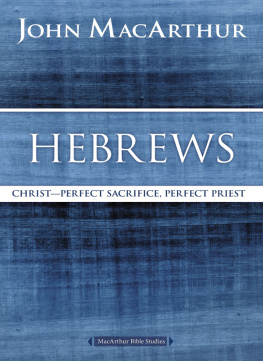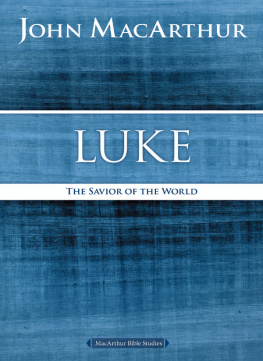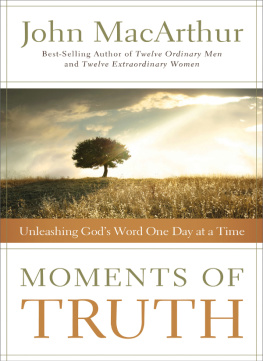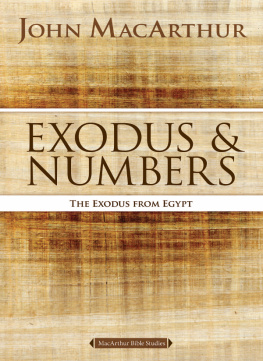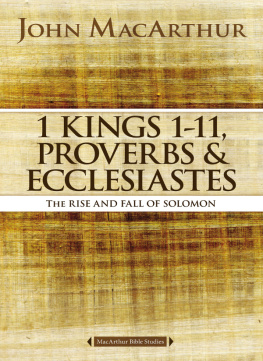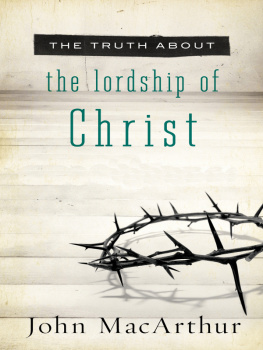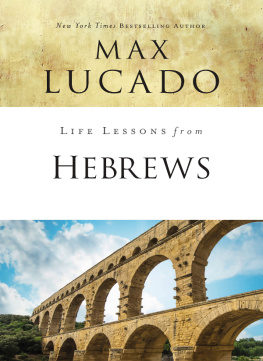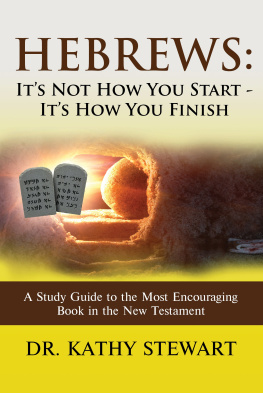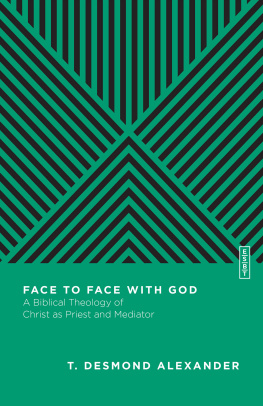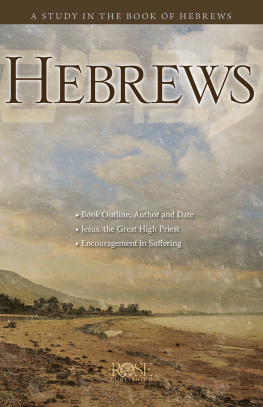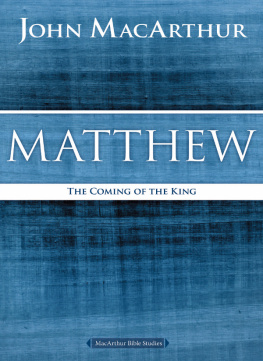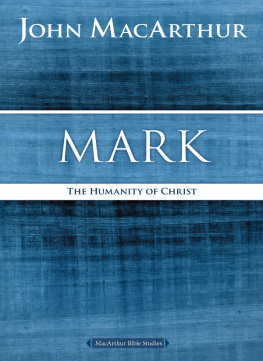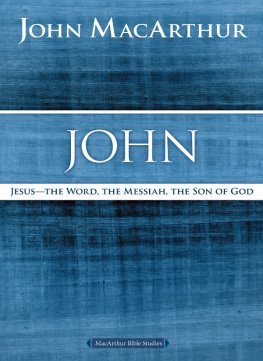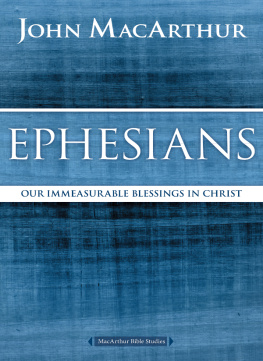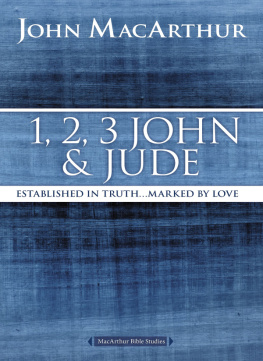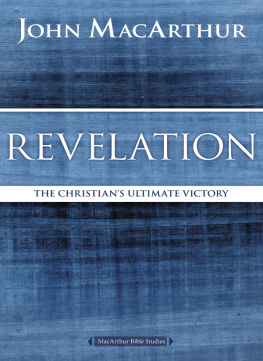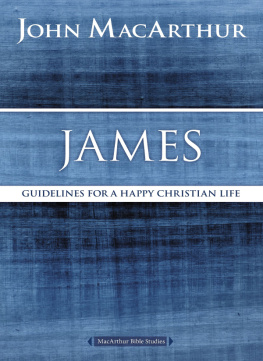
HEBREWS
MACARTHUR BIBLE STUDIES
2007 John F. MacArthur, Jr.
All rights reserved. No portion of this book may be reproduced, stored in a retrieval system, or transmitted in any form or by any meanselectronic, mechanical, photocopy, recording, or any otherexcept for brief quotations in printed reviews, without the prior permission of the publisher.
Published in Nashville, Tennessee, by Nelson Books, an imprint of Thomas Nelson. Nelson Books and Thomas Nelson are registered trademarks of HarperCollins Christian Publishing, Inc.
Nelson Books titles may be purchased in bulk for education, business, fundraising, or sales promotional use. For information, please email SpecialMarkets@ThomasNelson.com.
Published in association with the literary agency of Wolgemuth & Associates, Inc.
Produced with the assistance of the Livingstone Corporation. Project staff include Jake Barton, Betsy Todt Schmitt, and Andy Culbertson. Project editors: Mary Horner Collins, Amber Rae, and Len Woods.
Scripture quotations marked NKJV are taken from the The New King James Version. 1982 by Thomas Nelson, Inc. Used by permission. All rights reserved.
Unleashing Gods Truth, One Verse at a Time is a trademark of Grace to You. All rights reserved.
Truth for Today material taken from Hebrews: The MacArthur New Testament Commentary Series. 1983, 1996 by John F. MacArthur. Published by Moody Press, Chicago, Illinois. Used by permission.
Keys to the Text material taken from the following sources:
The God Who Loves. 1996, 2003 by John F. MacArthur. Published by Thomas Nelson Publishers.
The MacArthur Study Bible (electronic ed.), John MacArthur, General Editor. 1997 by Word Publishing. All rights reserved. Used by permission.
Nelsons New Illustrated Bible Dictionary, Rev. ed. R. F. Youngblood, F. F. Bruce, R. K. Harrison, editors. 1995 by Thomas Nelson Publishers. Used by permission.
Romans: The MacArthur New Testament Commentary Series. 1991, 1994, 1996 by John F. MacArthur. Published by Moody Press, Chicago, Illinois. Used by permission.
Cover Art by Holly Sharp Design
Interior Design and Composition by Joel Bartlett, Livingstone Corporation
ISBN: 978-0-7180-3515-0
ISBN: 978-0-7180-3534-1 (eBook)
In this ebook edition, please use your devices note-taking function to record your thoughts wherever you see the bracketed instructions [Your Notes] or [Your Response Here]. Use your devices highlighting function to record your response whenever you are asked to checkmark, circle, underline, or otherwise indicate your answer(s).
CONTENTS
When the various New Testament books were formally brought together into one collection shortly after AD 100, the titles were added for convenience. This epistle bears the traditional Greek title To the Hebrews, which was attested to by at least the second century AD. Within the epistle itself, however, there is no identification of the recipients as either Hebrews (Jews) or Gentiles. Since the epistle is filled with references to Hebrew history and religion and does not address any particular Gentile or pagan practice, the traditional title has been maintained.
AUTHOR AND DATE
The author of Hebrews is unknown. Paul, Barnabas, Silas, Apollos, Luke, Philip, Priscilla, Aquila, and Clement of Rome have been suggested by different scholars, but the epistles vocabulary, style, and various literary characteristics do not clearly support any particular claim. It is significant that the writer includes himself among those people who had received confirmation of Christs message from others (2:3). That would seem to rule out someone like Paul, who claimed that he had received such confirmation directly from God and not from men (Gal. 1:12). Whoever the author was, he preferred citing Old Testament references from the Greek Old Testament (LXX) rather than from the Hebrew text. Even the early church expressed various opinions on authorship, and current scholarship admits the puzzle still has no solution. Therefore, it seems best to accept the epistles anonymity. Ultimately, of course, the author was the Holy Spirit (2 Pet. 1:21).
The use of the present tense in 5:14; 7:21, 23, 2728; 8:35, 13; 9:69, 13, 25; 10:1, 34, 8, 11; and 13:1011 would suggest that the Levitical priesthood and sacrificial system were still in operation when the epistle was composed. Since the temple was destroyed by General (later Emperor) Titus Vespasian in AD 70, the epistle must have been written prior to that date. In addition, it may be noted that Timothy had just been released from prison (13:23) and that persecution was becoming severe (10:3239; 12:4; 13:3). These details suggest a date for the epistle of around AD 6769.
BACKGROUND AND SETTING
Emphases on the Levitical priesthood and on sacrifices, as well as the absence of any reference to the Gentiles, support the conclusion that a community of Hebrews was the recipient of the epistle. Although these Hebrews were primarily converts to Christ, there were probably a number of unbelievers in their midst who were attracted by the message of salvation but had not yet made a full commitment of faith in Christ (see Interpretive Challenges). One thing is clear from the contents of the epistle: The community of Hebrews was facing the possibility of intensified persecution (10:3239; 12:4). As they confronted this possibility, the Hebrews were tempted to cast aside any identification with Christ. They may have considered demoting Christ from Gods Son to a mere angel. Such a precedent had already been set by the Qumran community of messianic Jews living near the Dead Sea. They had dropped out of society, established a religious commune, and included the worship of angels in their brand of reformed Judaism. The Qumran community had even gone so far as to claim that the angel Michael was higher in status than the coming Messiah. These kinds of doctrinal aberrations could explain the emphasis in the first chapter of Hebrews on the superiority of Christ over the angels.
Possible locations for the recipients of the epistle include Palestine, Egypt, Italy, Asia Minor, and Greece. The community that was the primary recipient may have circulated the epistle among those of Hebrew background in neighboring areas and churches. Those believers probably had not seen Christ personally. Apparently, they had been evangelized by those who heard Christ and whose ministries had been authenticated with signs and wonders, with various miracles (2:34). Thus the recipients could have been in a church outside Judea and Galilee or in a church in those areas, but established among people in the generation following those who had been eyewitnesses of Christ. The congregation was not new or untaught (by this time you ought to be teachers) yet some of them still needed milk and not solid food (5:12). Those from Italy (13:24) is an ambiguous reference since it could mean either those who had left Italy and were living elsewhere, or those who were still in Italy and being singled out as native residents of that country. Greece or Asia Minor must also be considered because of the apparently early establishment of the church there, and because of the consistent use of the LXX.
The generation of Hebrews receiving this epistle had practiced the Levitical sacrifices at the temple in Jerusalem. Jews living in exile had substituted the synagogue for the temple but still felt a deep attraction to the temple worship. Some had the means to make regular pilgrimages to the temple in Jerusalem. The writer of this epistle emphasized the superiority of Christianity over Judaism and the superiority of Christs once-for-all sacrifice over the repeated and imperfect Levitical sacrifices observed in the temple.
Next page
